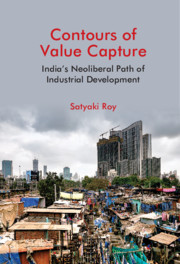Book contents
- Frontmatter
- Dedication
- Contents
- Tables and Figures
- Preface
- 1 introduction
- 2 Manufacturing versus Services: A Misplaced Debate
- 3 Global Production Network: India and Developing Countries
- 4 Financialisation in India: Emerging Trends in the Corporate Sector
- 5 Hierarchies of Capital and the Architecture of Value Capture
- 6 Informality: Regime of Accumulation and Discourse of Power
- 7 Self-Employment as Disguised Dispossession
- 8 Land Acquisition in India: Revisiting Primitive Accumulation
- 9 Decoding Resistance and Class Formation in the Neoliberal Regime
- 10 Conclusion
- References
- Index
5 - Hierarchies of Capital and the Architecture of Value Capture
Published online by Cambridge University Press: 26 March 2020
- Frontmatter
- Dedication
- Contents
- Tables and Figures
- Preface
- 1 introduction
- 2 Manufacturing versus Services: A Misplaced Debate
- 3 Global Production Network: India and Developing Countries
- 4 Financialisation in India: Emerging Trends in the Corporate Sector
- 5 Hierarchies of Capital and the Architecture of Value Capture
- 6 Informality: Regime of Accumulation and Discourse of Power
- 7 Self-Employment as Disguised Dispossession
- 8 Land Acquisition in India: Revisiting Primitive Accumulation
- 9 Decoding Resistance and Class Formation in the Neoliberal Regime
- 10 Conclusion
- References
- Index
Summary
The global edifice of capitalism is hierarchical in nature and the relative position of a particular capital in this structural hierarchy defines its returns. The returns are uneven as the development of capitalism pans out unevenly across the globe. Indeed, the positions of different capital are not fixed forever either in absolute terms or in relative measures. Hence, the relative development of positions in terms of ‘catching up’ or moving up the ladder has been the dominant discourse in various theories within the broad genre of development literature. Presuming the unreal world of perfect competition as the never-existing ‘ideal’, economic theory captures such unevenness arising out of concentration and centralisation of capital as sources of rents. Rents accrue to legal proprietorship of resource that is scarce. Capital and land become sources of rent not because they are scarce due to natural reasons, but because of the institution of private property that makes resources scarce. Hence, the distribution of property rights is fundamental to the accumulation of rents. If ground rent is the return to the landlord owning land, profit is also the return to the capital-owning class. Notably, in all sorts of property, income owners receive an extra return without surrendering the ownership of property altogether and simply the act of lending the resource fetches the owner a return in the form of rent. The absolute rent that emerges because of proprietary ownership of land and capital were termed by Ricardo as landowner's rent and capitalist's profit respectively. Ricardo, however, makes a distinction between landlord's income and capitalist's profit. Capitalists save and do not waste wealth by way of luxurious consumption. Hence, they create resources for investment assuming that all resources saved would be invested in the future. Also, the capitalist was considered to be ‘internal’ to the process of production as against a ‘functionless investor’1 because s/he manages the production process. But this distinction was meaningful so long as the separation of ownership and control in capitalist enterprise did not reach the level of joint stock companies. Further, the proposition that supply of savings automatically creates demand for investment had not been challenged in theory as well as in the real world. Keynes was rather explicit in identifying the ‘absentee owner’, the parasitical ‘third’ class, the rentiers who thrive on returns that come without any genuine sacrifice.
- Type
- Chapter
- Information
- Contours of Value CaptureIndia's Neoliberal Path of Industrial Development, pp. 81 - 101Publisher: Cambridge University PressPrint publication year: 2020



